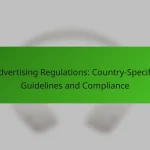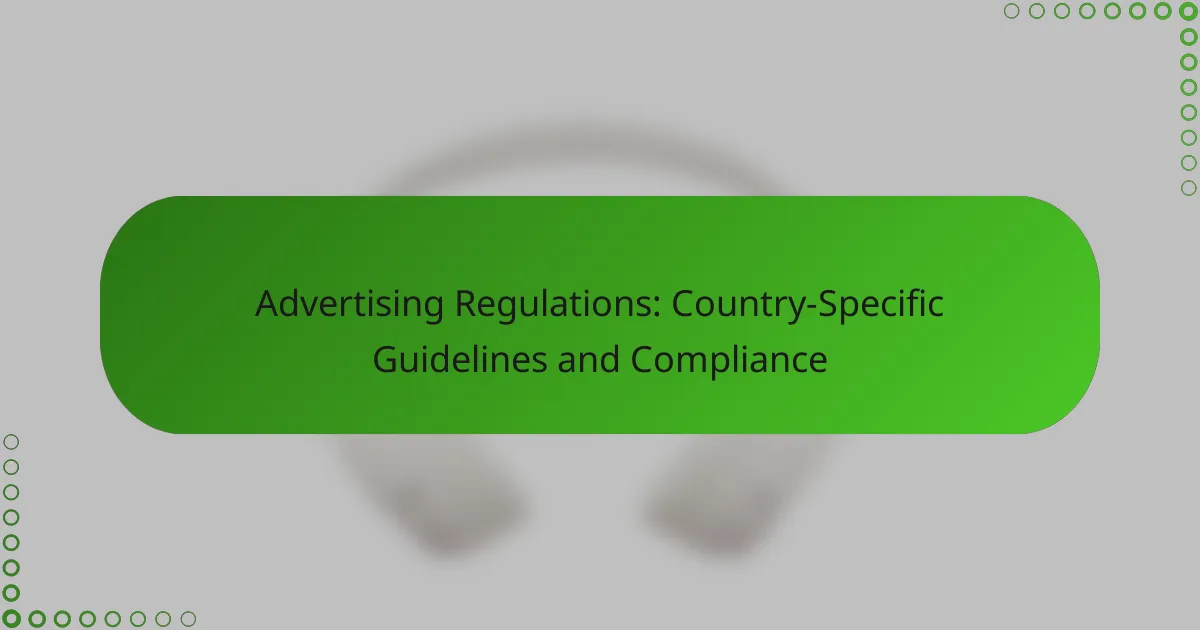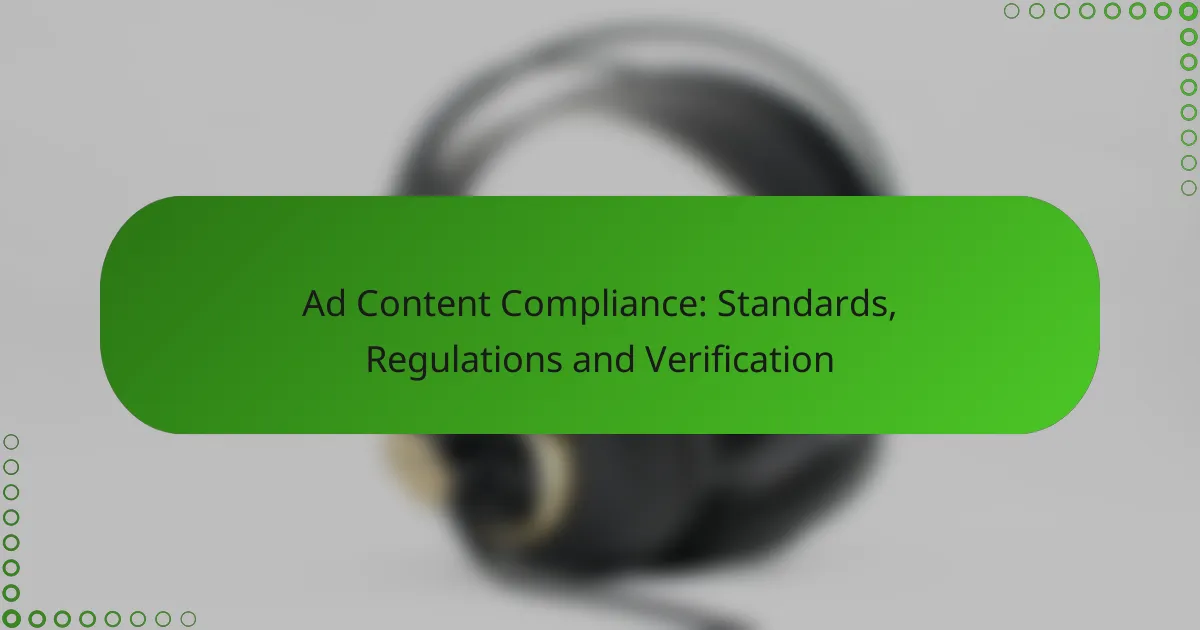Advertising regulations vary significantly across countries, with each jurisdiction establishing guidelines to protect consumers and ensure fair practices. In the United States, regulations focus on preventing misleading advertisements, while the European Union enforces strict compliance related to consumer protection and data privacy. Advertisers must adopt comprehensive compliance measures, including audits and legal consultations, to navigate these complex requirements effectively.
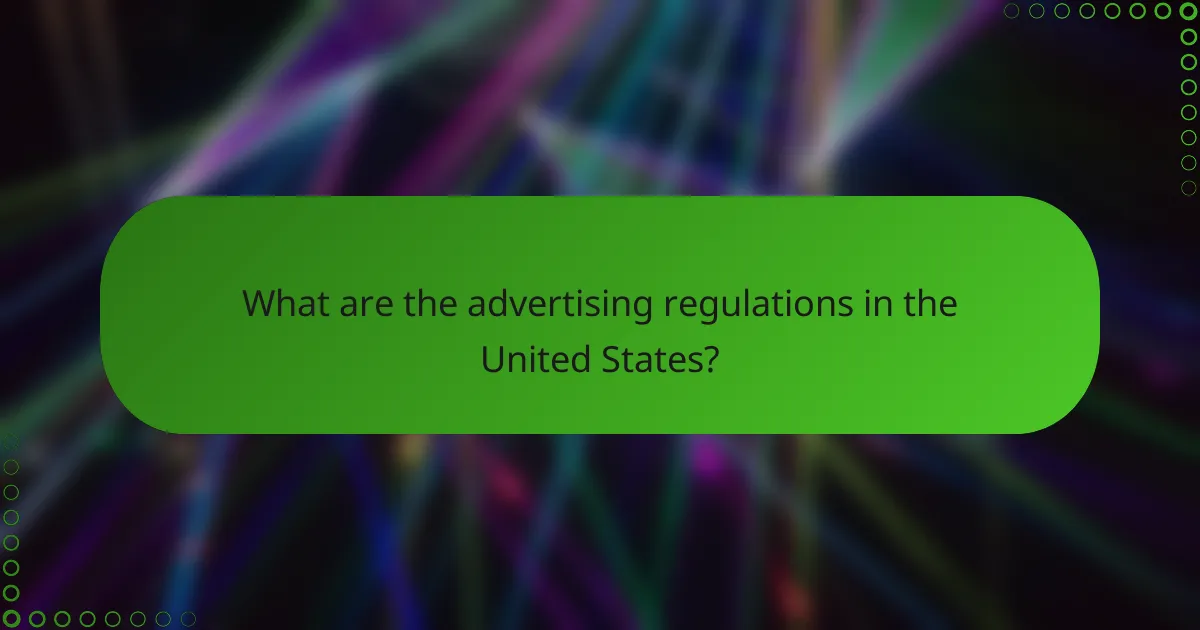
What are the advertising regulations in the United States?
Advertising regulations in the United States are designed to protect consumers from misleading or deceptive practices. These regulations are enforced at both federal and state levels, ensuring that advertisements are truthful and substantiated.
Federal Trade Commission (FTC) guidelines
The Federal Trade Commission (FTC) establishes key guidelines for advertising in the U.S. These rules require that advertisements must be truthful, not misleading, and backed by evidence when making claims. The FTC also focuses on specific areas such as endorsements, testimonials, and the use of fine print.
Advertisers should ensure that any claims made in their advertisements can be substantiated with appropriate evidence. For instance, if a product claims to be the “best” in its category, the advertiser must have data to support that assertion.
State-specific advertising laws
In addition to federal regulations, each state has its own advertising laws that may impose additional requirements or restrictions. These laws can vary significantly, addressing issues like false advertising, promotional pricing, and specific disclosures that must be made in advertisements.
Businesses should familiarize themselves with the advertising laws in the states where they operate. For example, some states may require specific disclosures for certain types of products, such as health-related items or financial services.
Industry-specific regulations
Certain industries are subject to additional advertising regulations that go beyond general guidelines. For example, the pharmaceutical industry must adhere to strict rules regarding the promotion of prescription medications, including mandatory disclosures about side effects and contraindications.
Similarly, advertising in sectors like alcohol, tobacco, and financial services often comes with heightened scrutiny and specific compliance requirements. Companies in these sectors should consult relevant regulatory bodies to ensure their advertising practices meet all necessary standards.
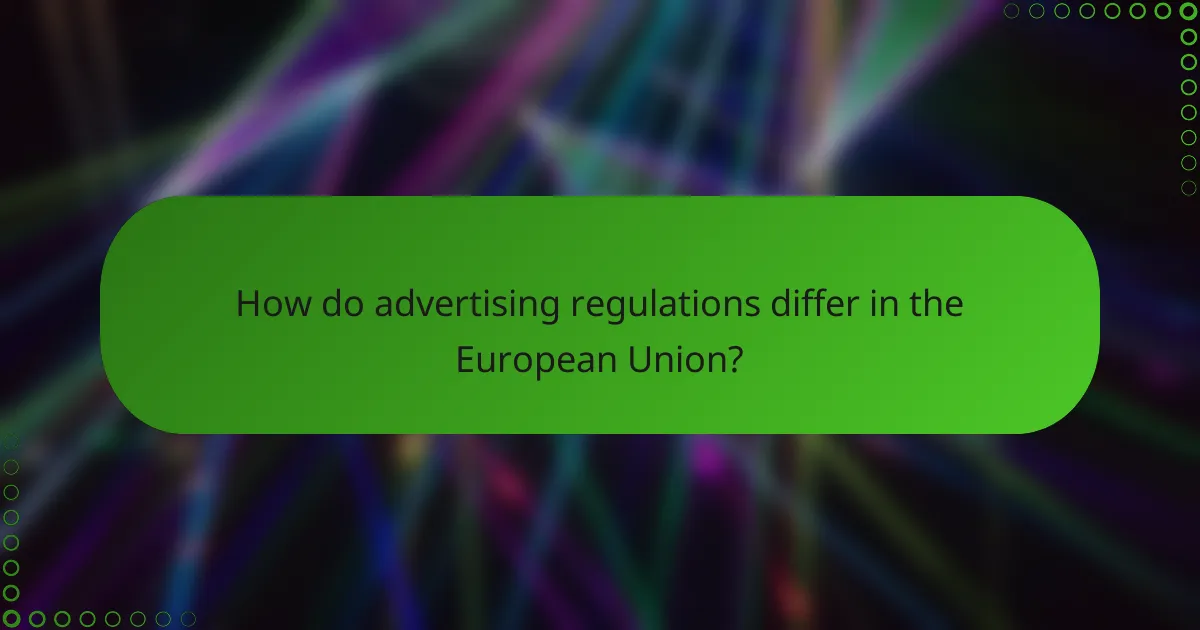
How do advertising regulations differ in the European Union?
Advertising regulations in the European Union (EU) are characterized by strict compliance requirements that vary by member state. These regulations focus on consumer protection, data privacy, and specific advertising standards that businesses must adhere to when targeting EU citizens.
General Data Protection Regulation (GDPR)
The General Data Protection Regulation (GDPR) is a comprehensive data privacy law that applies to all organizations operating within the EU. It mandates that businesses obtain explicit consent from individuals before collecting or processing their personal data for advertising purposes.
Companies must ensure transparency in how they use consumer data and provide clear options for individuals to opt-out of data collection. Non-compliance can result in hefty fines, often amounting to millions of euros, making adherence crucial for advertisers.
EU ePrivacy Directive
The EU ePrivacy Directive complements the GDPR by specifically addressing privacy in electronic communications. This directive requires that businesses obtain consent before sending marketing communications via email, SMS, or other electronic means.
Advertisers must also provide clear information about how consumers can withdraw their consent at any time. Failure to comply with these requirements can lead to significant penalties and damage to brand reputation.
Country-specific advertising standards
Each EU member state has its own set of advertising standards that may impose additional requirements beyond EU-wide regulations. For example, countries like Germany and France have stringent rules regarding misleading advertisements and the promotion of certain products, such as alcohol and tobacco.
Advertisers should familiarize themselves with local laws and guidelines to avoid legal issues. Consulting with legal experts or local advertising authorities can help ensure compliance with these country-specific standards.
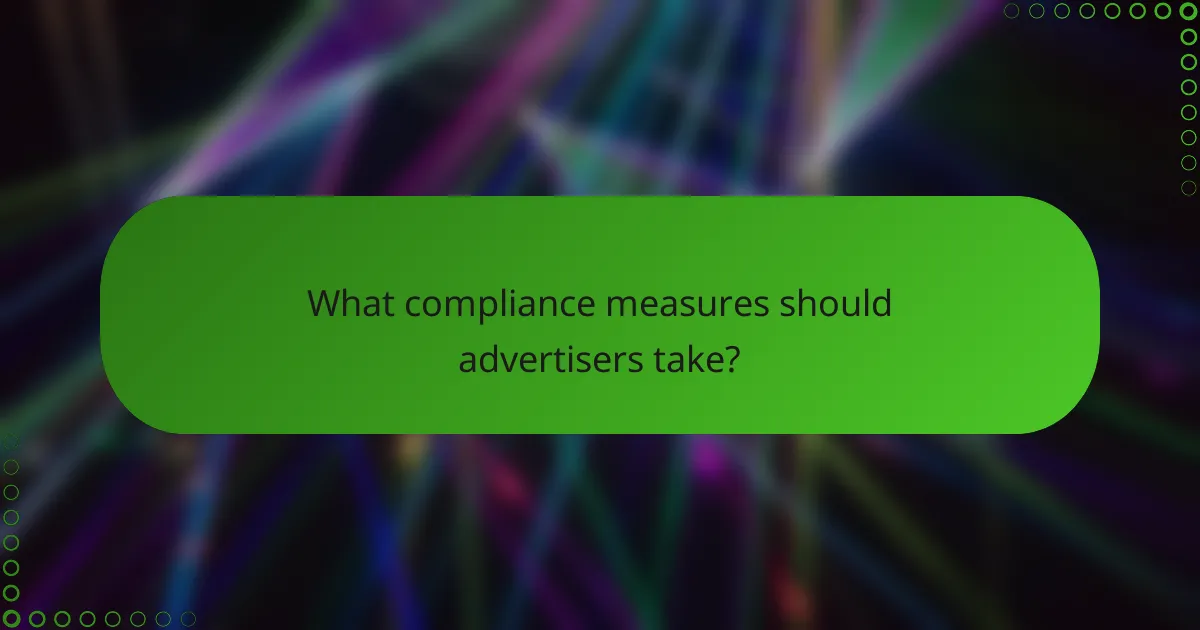
What compliance measures should advertisers take?
Advertisers should implement a variety of compliance measures to ensure their advertising content adheres to legal standards and ethical guidelines. Key steps include conducting regular audits, providing training for marketing teams, and consulting with legal experts to navigate the complex landscape of advertising regulations.
Regular audits of advertising content
Regular audits of advertising content are essential for identifying potential compliance issues before they escalate. These audits should evaluate whether advertisements meet local regulations, truthfulness, and ethical standards. A good practice is to conduct these audits quarterly or biannually, depending on the volume of advertising produced.
During audits, focus on key areas such as claims made in advertisements, the use of testimonials, and adherence to specific industry regulations. Create a checklist to streamline the process, ensuring that all aspects of the content are reviewed consistently.
Training for marketing teams
Training for marketing teams is crucial to ensure that all members understand compliance requirements and best practices in advertising. Regular workshops or training sessions can help keep the team updated on changes in regulations and industry standards. Consider incorporating case studies of successful and unsuccessful campaigns to illustrate the importance of compliance.
Encourage a culture of compliance by providing resources such as guidelines, handbooks, and access to legal advice. This proactive approach can significantly reduce the risk of non-compliance and enhance the overall quality of advertising efforts.
Consultation with legal experts
Consultation with legal experts is vital for navigating the complexities of advertising regulations. Engaging legal professionals who specialize in advertising law can help identify potential pitfalls and ensure that marketing strategies align with current laws. This is especially important when entering new markets or launching innovative advertising campaigns.
Establish a routine for consulting with legal experts, such as before launching new campaigns or when making significant changes to existing content. This practice not only mitigates risks but also fosters a more compliant advertising environment.

What are the penalties for non-compliance?
Penalties for non-compliance with advertising regulations can include financial fines, sanctions, and damage to a company’s reputation. These consequences vary by country and the severity of the violation, making it crucial for businesses to understand the specific regulations they must follow.
Fines and sanctions
Fines for non-compliance can range from low hundreds to millions of dollars, depending on the jurisdiction and the nature of the violation. For example, in the United States, the Federal Trade Commission (FTC) can impose fines that reach into the millions for deceptive advertising practices. Additionally, companies may face sanctions such as the suspension of advertising privileges or mandatory corrective advertising.
Sanctions may also include the requirement to cease certain marketing practices immediately. Businesses should regularly review their advertising strategies to ensure compliance and avoid these costly penalties.
Reputational damage
Non-compliance can lead to significant reputational damage, which may have long-lasting effects on a brand’s image. Consumers are increasingly aware of ethical advertising practices, and violations can result in loss of trust and customer loyalty. A tarnished reputation can take years to rebuild, impacting sales and market position.
To mitigate reputational risks, companies should implement robust compliance programs and conduct regular audits of their advertising materials. Transparency in marketing practices can also help maintain consumer trust and protect against potential fallout from non-compliance.
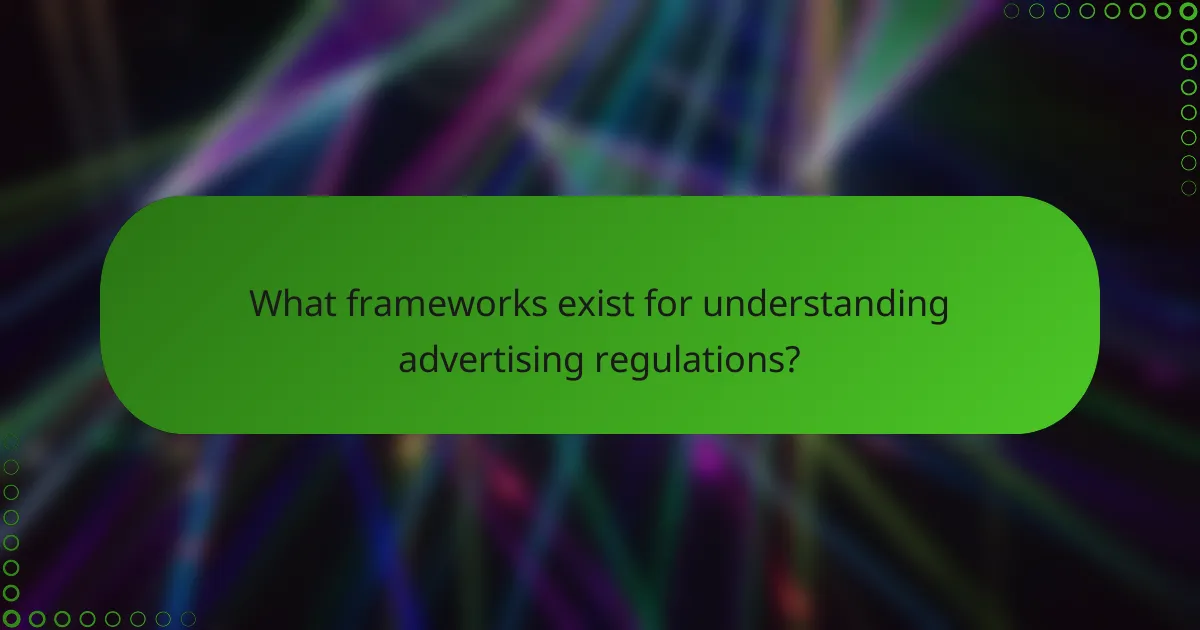
What frameworks exist for understanding advertising regulations?
Advertising regulations are structured around various frameworks that guide compliance and ethical practices. These frameworks often include national laws, industry standards, and self-regulatory codes that vary by country and sector.
Compliance checklists
Compliance checklists are essential tools for ensuring that advertising practices meet legal and ethical standards. A typical checklist might include verifying that all claims are substantiated, ensuring proper disclosures for endorsements, and confirming that advertisements do not mislead consumers.
For example, in the United States, the Federal Trade Commission (FTC) requires clear disclosures for sponsored content. Advertisers should regularly review their materials against these checklists to avoid potential penalties.
Legal resources and databases
Legal resources and databases provide crucial information about advertising regulations and compliance requirements. Many countries have official government websites that outline advertising laws, while industry associations often publish guidelines and best practices.
In Europe, the European Advertising Standards Alliance (EASA) offers resources that help advertisers understand local regulations across member states. Utilizing these resources can help businesses stay informed and compliant with evolving advertising laws.

How can advertisers stay updated on regulatory changes?
Advertisers can stay informed about regulatory changes by actively engaging with industry resources and educational opportunities. Regularly checking reliable sources ensures compliance and helps avoid potential legal issues.
Industry newsletters
Subscribing to industry newsletters is an effective way for advertisers to receive timely updates on regulatory changes. These newsletters often summarize key developments, highlight important deadlines, and provide insights from experts in the field.
Examples of reputable newsletters include those from advertising associations and legal firms specializing in marketing regulations. Consider subscribing to at least two or three to cover various perspectives and insights.
Webinars and training sessions
Participating in webinars and training sessions is another valuable method for staying updated on advertising regulations. These events often feature industry leaders discussing recent changes and best practices for compliance.
Look for webinars hosted by regulatory bodies or industry organizations. Many of these sessions are free or low-cost, making them accessible for advertisers of all sizes. Aim to attend at least one session per quarter to keep your knowledge current.
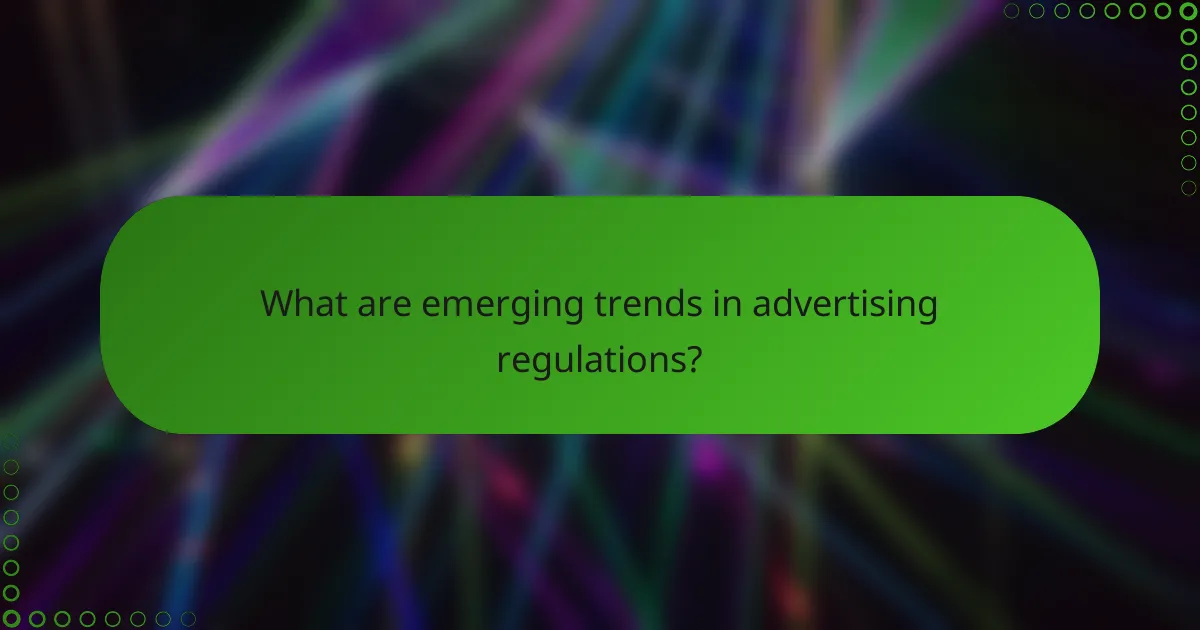
What are emerging trends in advertising regulations?
Emerging trends in advertising regulations focus on increased transparency, consumer privacy, and the impact of digital platforms. Regulators are adapting to technological advancements and changing consumer expectations, leading to new guidelines that prioritize ethical advertising practices.
Increased focus on consumer privacy
As data privacy concerns grow, regulations are tightening around how advertisers collect and use consumer information. Laws like the General Data Protection Regulation (GDPR) in Europe and the California Consumer Privacy Act (CCPA) in the United States emphasize the need for clear consent and transparency in data handling.
Advertisers must ensure compliance by implementing robust data protection measures and providing clear privacy policies. Failing to do so can result in significant fines and damage to brand reputation.
Regulations on influencer marketing
Influencer marketing is under scrutiny as regulators seek to ensure that endorsements are clearly disclosed. Guidelines from the Federal Trade Commission (FTC) in the U.S. require influencers to label sponsored content transparently to avoid misleading consumers.
Brands should provide clear instructions to influencers about disclosure practices, such as using hashtags like #ad or #sponsored. This not only complies with regulations but also builds trust with the audience.
Restrictions on targeted advertising
Targeted advertising, particularly in sensitive areas like health and finance, is facing stricter regulations. Authorities are concerned about the potential for discrimination and the ethical implications of using personal data for ad targeting.
Advertisers should review their targeting strategies to ensure compliance with local laws and ethical standards. This may involve limiting the use of sensitive data and providing consumers with more control over their ad preferences.
